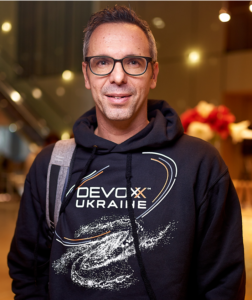
In recent times, the world of natural language processing (NLP) has been ablaze with excitement, all thanks to the magnificent prowess of large language models (LLMs). These intellectual marvels have demonstrated their brilliance across a vast spectrum of language-related tasks, capturing the imaginations of experts and enthusiasts alike. Stephan Janssen, the visionary founder of Devoxx Belgium, delivered a presentation at Devoxx France 2023 with his compelling discourse on LLMs, their evolution, and their boundless capabilities.
Stephan walked the audience through the enchanting realm of LLMs, offering a treasure trove of code examples that revealed the secrets of harnessing the power of GPT in your very own projects. The landscape of LLMs has undergone a metamorphosis, expanding at a breakneck pace over the last few years. The open-source community has been abuzz with initiatives that empower you to conjure GPT-like bots right on your own machine. These initiatives are closely tied to the LLaMA project, released by the tech juggernaut Facebook. It’s a whirlwind of innovation, where keeping up can be as challenging as chasing a shooting star.
Delving further into the captivating world of LLMs, one finds multiple stages in their creation, with models evolving through reinforcement learning driven by human feedback. It’s akin to nurturing an artificial intelligence entity, watching it grow and adapt in response to its environment. The highlight of Stephan’s presentation was an exemplary application where ChatGPT demonstrated its design prowess. Stephan’s daily reliance on ChatGPT highlighted a crucial truth – the art of crafting the perfect prompt. In his application, he unveiled the magic of an open-sourced API from OpenAI that could transmute your spoken words into text, only to have ChatGPT translate it seamlessly into your desired language. The catch? You need to provide ChatGPT with the right context, a critical piece of the puzzle.
The speaker didn’t stop at mere theory; he also showcased practical Python techniques for working with ChatGPT when the demand surges beyond OpenAI’s capacity. It’s all about clever model fallback strategies, where you ensure a smooth transition when ChatGPT needs a handoff. His use cases included a dazzling translation application, employing Whisper for audio-to-text conversion and ChatGPT for language translation.
Stephan also offered insights into conducting semantic analysis using word embeddings, a fascinating realm where words are transformed into real-valued vectors within a predefined space. The speaker took things up a notch by introducing the audience to the magical world of LangChain, a Python library that beautifully complements the power of embeddings. ChatGPT could also be summoned to generate keywords based on the content of the conversation or even to craft crisp summaries of lengthy discussions. As a bonus, it could be prompted to correct its own spelling errors if provided with the right context.
Speaker’s journey through the capabilities of ChatGPT continued, revealing the art of scheduling organization. He touted ChatGPT’s prowess in crafting well-structured programs, painting a picture of remarkable success with a Python application generated in response to his request. For those who seek even more enchantment, GPT Plugins emerged as the ultimate spellbooks, expanding ChatGPT’s capabilities with a simple prompt activation. The possibilities seemed as limitless as a boundless universe of knowledge.
In conclusion, a profound revolution in large language models is underway. The speaker’s resounding advice to senior developers is to harness the potential of ChatGPT for enhanced productivity. With ChatGPT as their expert assistant and a wise oracle, they can effortlessly craft code of unparalleled quality. It’s the expert assistant you’ve always dreamed of, bringing the world of LLMs within your reach, and with it, the power to conjure remarkable solutions with the mere utterance of a prompt.